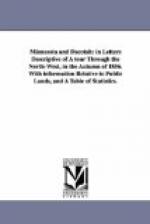LETTER II.
Chicago to st. Paul.
Railroads to the Mississippi— Securing passage on the steamboat— The Lady Franklin— Scenery of the Mississippi— Hastings— Growth of settlements
St. Paul, October, 1856.
How short a time it is since a railroad to the Mississippi was thought a wonder! And now within the state of Illinois four terminate on its banks. Of course I started on one of these roads from Chicago to get to Dunleith. I think it is called the Galena and Chicago Union Road. A good many people have supposed Galena to be situated on the Mississippi river, and indeed railroad map makers have had it so located as long as it suited their convenience— (for they have a remarkable facility in annihilating distance and in making crooked ways straight)— yet the town is some twelve miles from the great river on a narrow but navigable stream. The extent and importance of Rockford, Galena, and Dunleith cannot fail to make a strong impression on the traveller. They are towns of recent growth, and well illustrate that steam-engine sort of progress peculiar now-a-days in the west. Approaching Galena we leave the region of level prairie and enter a mineral country of naked bluffs or knolls, where are seen extensive operations in the lead mines. The trip from Chicago to Dunleith at the speed used on most other roads would be performed in six hours, but ten hours are usually occupied, for what reason I cannot imagine. However, the train is immense, having on board about six or seven hundred first class passengers, and two-thirds as many of the second class. Travelling in the cars out west is not exactly what it is between Philadelphia and New York, or New York and Boston, in this respect: that in the West more families are found, in the cars, and consequently more babies and carpet bags.
It may not be proper to judge of the health of a community by the appearance of people who are seen standing about a railroad station; yet I have often noticed, when travelling through Illinois, that this class had pale and sickly countenances, showing too clearly the traces of fever and ague.
But I wish to speak about leaving the cars at Dunleith and taking the steamboat for St. Paul. There is a tremendous rush for the boats in order to secure state-rooms. Agents of different boats approach the traveller, informing him all about their line of boats, and depreciating the opposition boats. For instance, an agent, or, if you please, a runner of a boat called Lucy— not Long— made the assertion on the levee with great zeal and perfect impunity that no other boat but the said Lucy would leave for St. Paul within twenty-four hours; when it must have been known to him that another boat on the mail line would start that same evening, as was actually the fact. But the activity of the runners was needless; for each boat had more passengers




